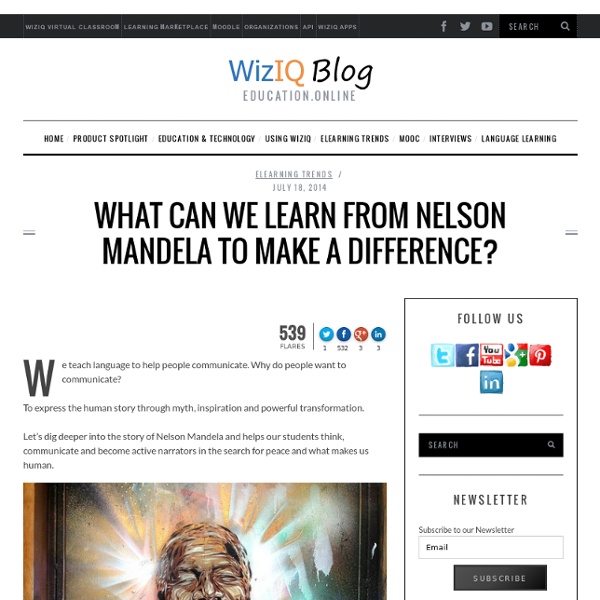What can we learn from Nelson Mandela to make a difference? - Official WizIQ Teach Blog

How is Social Media Transforming Human Rights Monitoring?
Syrian youths, inside a vehicle, film a protest against the regime of Syrian President Bashar al-Assad with their phones in the northern city of Aleppo on October 12, 2012. (Photo: TAUSEEF MUSTAFA/AFP/Getty Images) Social media is increasingly helpful to not only monitor emerging human rights emergencies, but also to uncover incorrect information. A recent example is when Twitter helped me to spot incorrect contextual information on a newly uploaded execution video from Syria. Of course, citizen journalism is not a new phenomenon―think of the Rodney King case in the early 1990s, to name just one well known example. The crime scene at your fingertips Similar to journalists, human rights researchers cannot cover all places at once and may be denied access to a potential crime scene altogether. In early December, a gruesome video came across my screen that depicted a child taking part in a beheading, reportedly the weekend of December 8, 2012, in Homs. Social media as evidence Limitations
International Principles on the Application of Human Rights to Communications Surveillance | Necessary and Proportionate
Commission Website: Information for Students - Human Rights Essentials - Human Rights Timeline
Human rights can be traced back through many centuries of history. You can also access the text only version of the timeline. Please note that the timeline below includes links to external websites. These links have been included for your information. Report broken links to: education@humanrights.gov.au Jump to:[Early Civilization] [1200 - 300 BCE] [Greek city-states] [500 BCE] [27 BCE - 476 CE] [40 - 100 CE] [476 – 1453] [1215] [1492 – 1537] [1583 -1645] [1628] [1648] [1689] [1776] [1789] [1791] [1815] [1833] [1841] [1848] [1863] [1885] [1890] [1893] [1901] [1902] [1907] [1914] [1919] [1920] [1926] [1930] [1933-1939] [1939] [1939-1945] [1941] [1942] [1945] [1946] [1948] [1949] [1951] [1953] [1958] [1961] [1962] [1965] [1966] [1967] [1973] [1975] [1976] [1979] [1981] [1984] [1986] [1989] [1990] [1992] [1993] [1994 – 2005] [1994] [1995] [1998] [2002] [2004] [2005] Early Civilization Click here to read The Code of Hamurabi, Translated by L. Back to top Greek city-states U.S.
Guideline 1
Related:
Related:



